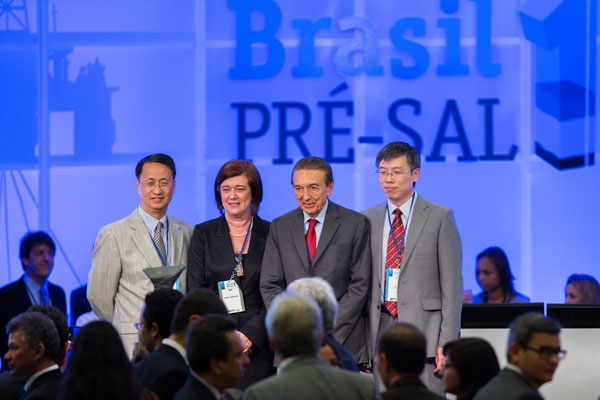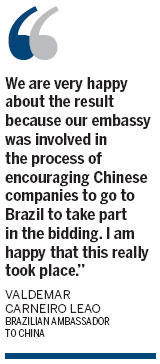

 |
|
Representatives of China National Offshore Oil Corp and China National Petroleum Corp flank Brazilian officials after a bidding ceremony on Oct 21 for a 35-year production sharing contract to develop Libra, a deepwater oilfield off the coast of Rio de Janeiro. [Photo/Xinhua] |
Leao made the remarks nearly three weeks after two Chinese State-owned oil giants, China National Offshore Oil Corp and China National Petroleum Corp, as part of a consortium comprising Royal Dutch Shell, France's Total SA and Brazil's state oil company Petrobras, were awarded a 35-year production sharing contract to develop Libra, a deepwater oilfield off the Rio coast estimated to hold up to 12 billion barrels of oil.
"We are very happy about the result because our embassy was involved in the process of encouraging Chinese companies to go to Brazil to take part in the bidding. I am happy that this really took place," he said.
This is the first time that a Chinese company will be involved in the oil exploration process in Brazil; previous cooperation with the nation mainly involved oil production.
China's oil companies are attempting to expand globally and observers said the two Chinese companies can gain valuable experience in deep-sea oil exploration. They will also be able to use that experience for future cooperation efforts with other international companies.

According to the parameters of the Brazilian auction, the consortium will have 35 years to explore the oilfield and are allowed a minimum of 41.65 percent of the field's reserves.
The Libra oilfield, located off Brazil's southeast coast, is the world's largest offshore oilfield. Production from the oilfield could double Brazil's oil reserves.

"We have high expectations for this field. It all points to a giant field so we hope that both Brazil and the companies can benefit from the production," the ambassador said.
He said it has taken at least five years to implement the project. He also praised China's rapid development of trade and commerce with Brazil.
Brazil, a mostly agricultural country, is currently China's largest trading partner in South America, while China is Brazil's largest trading partner and largest export and import market.
"I think it is indeed surprising that relations have developed in such a way," he said.
According to the China's General Administration of Customs, imports and exports between China and Brazil reached $67.64 billion by September, an increase of 3.2 percent compared to the previous year.
The ambassador did admit that Brazilian manufacturers face a number of difficulties in competing with Chinese companies, though he added that Brazil has a great deal of its own "homework to do" in stepping up to the challenge.
"The governments have settled their differences in the best possible way and moved forward. The important thing is that relations go as smoothly as possible," he said.
Brazilian Vice-President Michel Temer began his six-day visit to China on Monday with a delegation of government officials including Brazil's minister of agriculture, minister of science and technology and its central bank governor.
Temer said on the eve of his visit that the China-Brazil economic relationship has reached a new stage, and the Brazilian government will adjust its policies to attract more Chinese investment, especially in the oil industry.
"China's participation in oilfield exploration shows that the Brazilian government holds an open mind in this field. The difficulties Chinese companies faced when they entered the Brazilian market are due to the bureaucracy within our government, which we are trying to change as soon as possible. I believe there will be no such problems in the future," said Temer.
Temer on Monday participated in the 4th Ministerial Conference of the Forum on Trade and Economic Cooperation between China and Portuguese-speaking countries in Macao. He will co-host the Third Session of the China-Brazil High-level Coordination and Cooperation Committee together with Vice-Premier Wang Yang on Wednesday in Guangzhou.